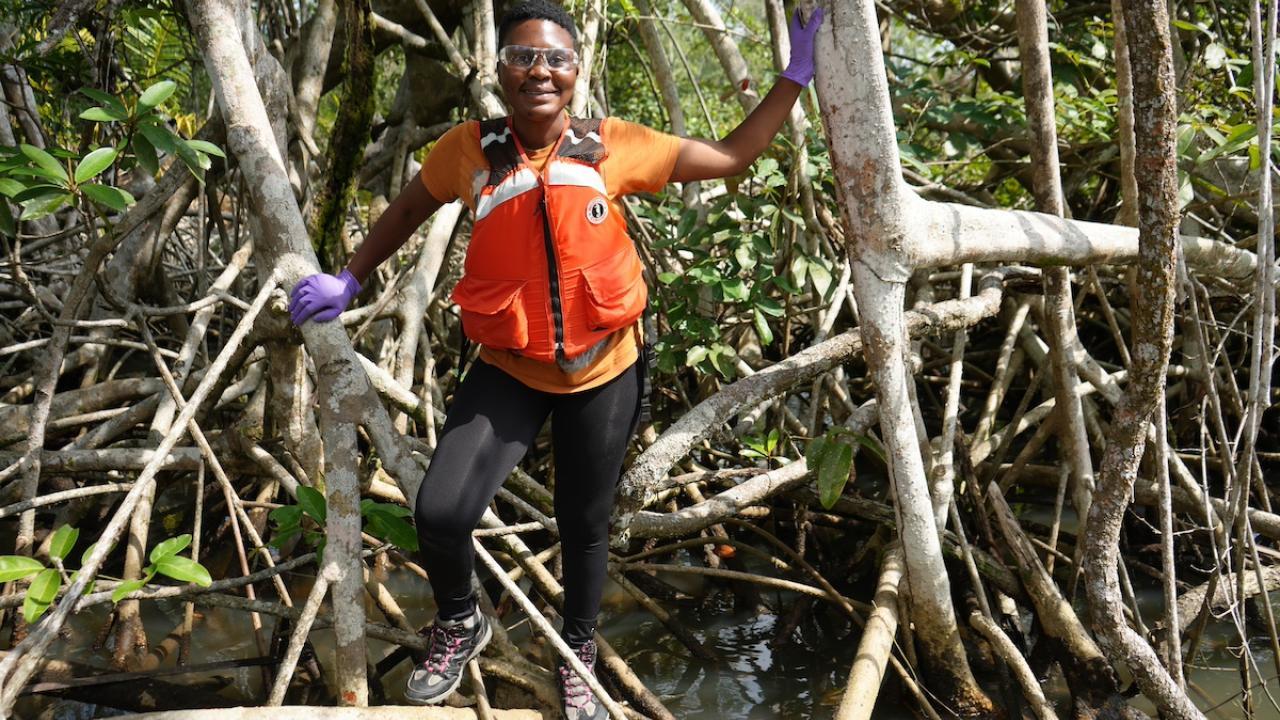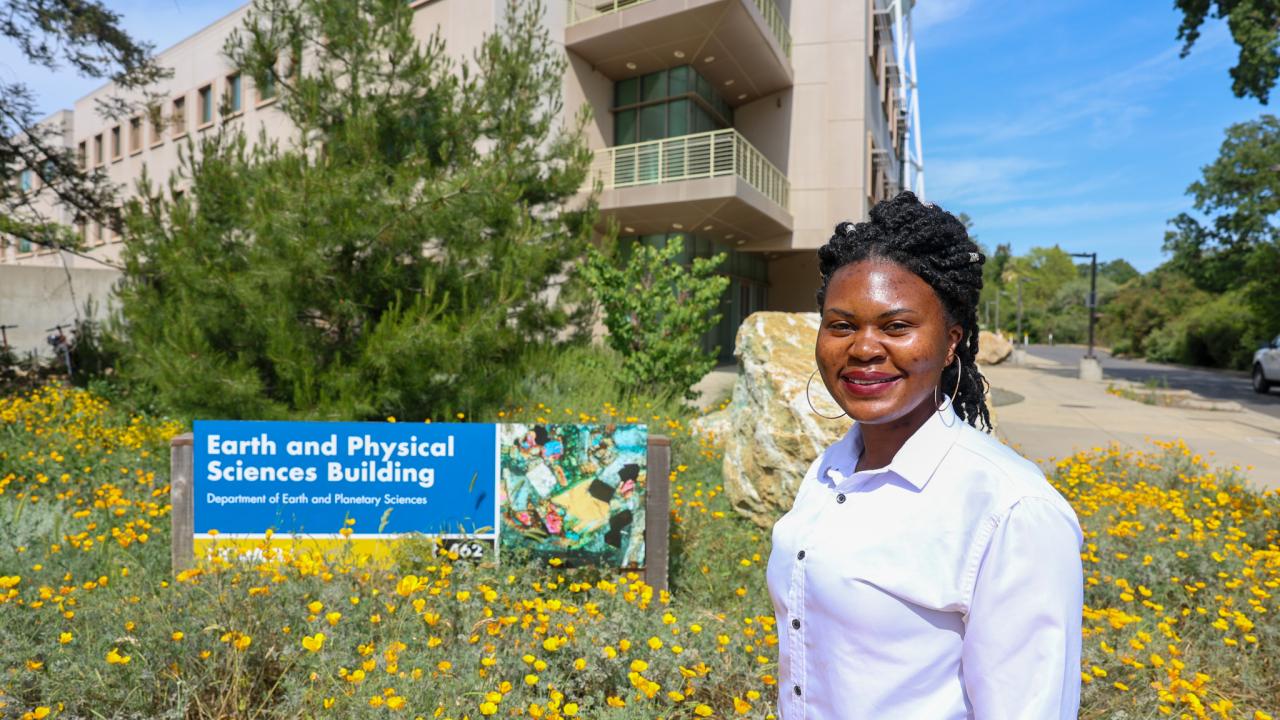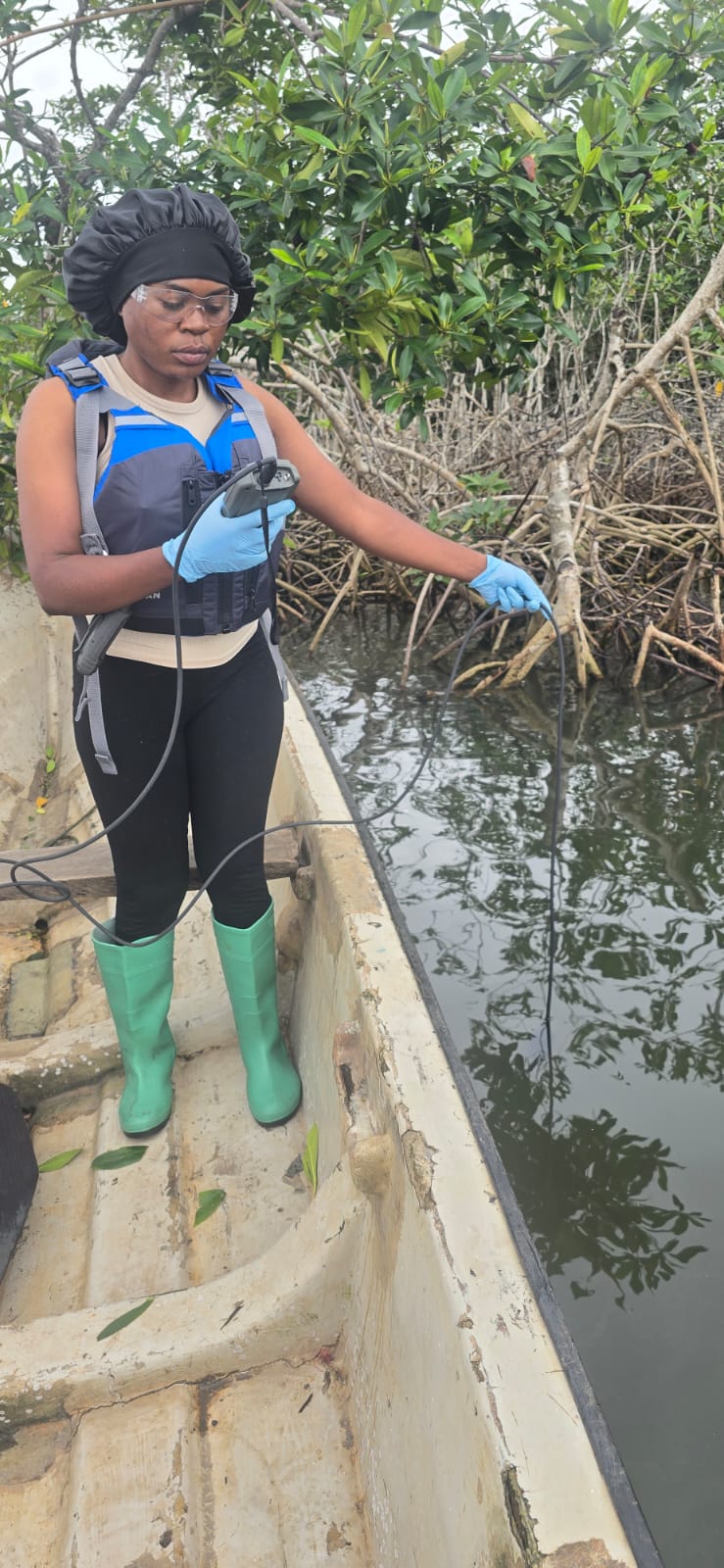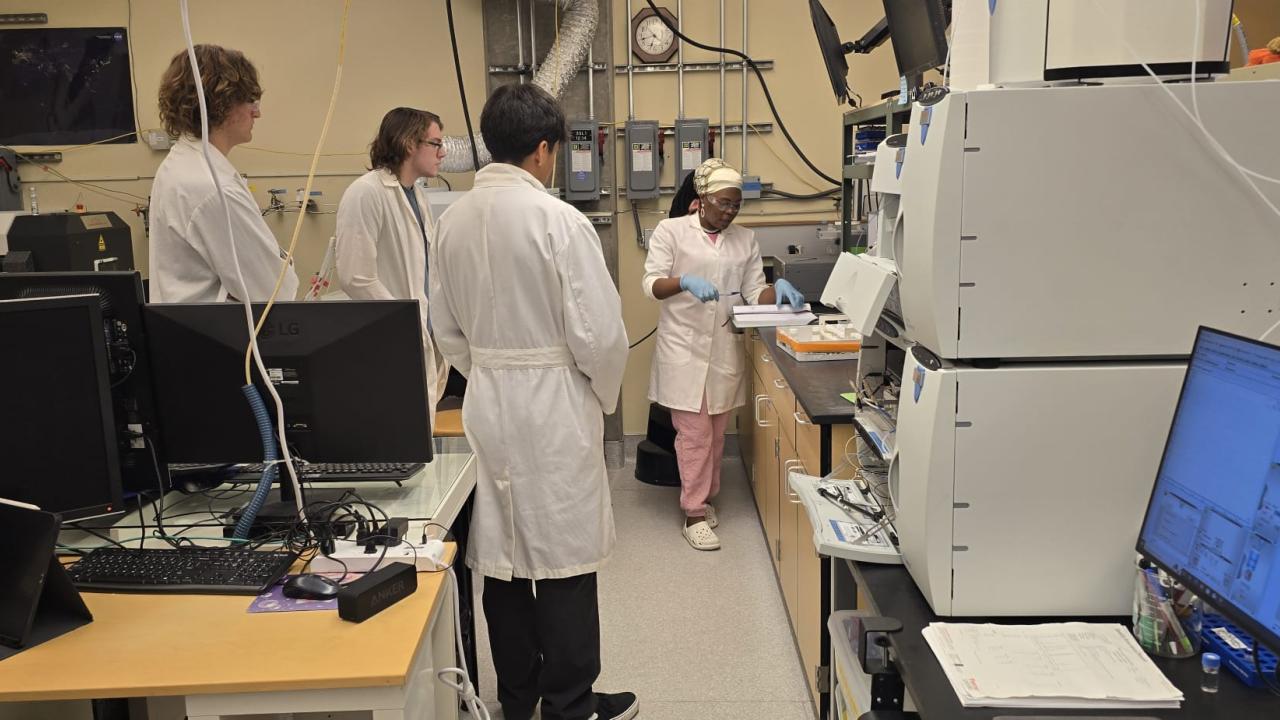
Assessing, Improving and Protecting Water Quality in Sub-Saharan Africa with Claris Nyuysoni Sunjo
Claris Nyuysoni Sunjo knows firsthand the dangers of living in a place with unsafe drinking water. Growing up in Mbah in Cameroon, Sunjo was once rushed to the hospital and even lost a friend due to waterborne illnesses. Those experiences triggered a desire within her. She wanted to harness science to address, mitigate and, perhaps, solve water quality issues in her home country and other areas in Sub-Saharan Africa.
Today, Sunjo is on the frontline of that research.
As a Ph.D. student in the lab of Eliot Atekwana, a professor in the Department of Earth and Planetary Sciences at the College of Letters and Science at UC Davis, Sunjo studies the health of tropical mangrove habitats in the Wouri Estuary located in Douala, Cameroon.
“Mangrove estuarine ecosystems are critical habitats for biodiversity that support seafood production,” Sunjo said. “Understanding how nutrients, both naturally occurring and anthropogenic, are sourced, transported, and cycled, and how that cycling affects the estuarine water chemistry is essential to improve the estuarine water quality and agricultural and industrial practices.”
For her critical research and leadership in the field, Sunjo was recently awarded the 2025-2026 Schlumberger Foundation Faculty for the Future Fellowship Award and the American Association of University Women International Doctoral Degree Fellowship. The fellowships provide $50,000 and $25,000 in funding, respectively. The awards recognize scientists, technologists, engineers and mathematicians who tackle pressing global issues, including health, water resources, climate change and more.
“Water is a fundamental human right. And coming from a background where there wasn’t good drinking water made me want to figure out how I could help find a solution for those water quality issues in my country.” — Claris Sunjo
“Everybody needs healthy water,” Sunjo added. “Securing such prestigious and competitive global awards is in part an external validation of the global impact of my research.”

Understanding the Wouri Estuary’s carbon cycle
Located in the Littoral region of Cameroon, the Wouri Estuary spills its waters into the Atlantic Ocean’s Gulf of Guinea. An array of mangrove species fill these waters, each one a hub for biodiversity and acting as a natural carbon sink, thus making them important agents in mitigating climate change.
Africa as a whole is home to the second-largest area (roughly 22%) of the world’s mangroves after Asia (33%), according to the Food and Agriculture Organization of the United Nations.
“Although Sub-Saharan Africa has the second-largest global mangrove, and their estuaries receive higher amounts of organic carbon, the region has not been characterized for its contributions to local, regional or even global cycling,” Sunjo said. “It is also quite intriguing that most of the estuaries in Sub-Saharan Africa are vulnerable to anthropogenic pollution.”
Substantial pollution from the nearby city of Douala, the economic center of Cameroon, threatens the Wouri Estuary. Although the threat from pollution is clear, not much is known about the hydrogeochemical specifics of it and how it’s affecting the water column carbon of the open water estuary.
That’s where Sunjo steps in with her research.

“My research seeks to identify sources and hotspots of nitrate pollution in the water column of open water of estuaries and show how nitrate-fueled eutrophication controls DIC cycling in the water column and releases anomalously high partial pressure of carbon dioxide to the atmosphere.” Sunjo said.
In summer 2023 and 2024, Sunjo conducted fieldwork for her project in the Wouri Estuary. She’d spend mornings, days or nights in the field, collecting water samples for later analysis. Her work was beholden to the tides, their demand for punctuality dictating the schedule. Arrive at the wrong time and the field site might be inaccessible, an experiment could be left unrun.
But Sunjo’s fieldwork was a success. She returned to UC Davis with water samples for analysis.
“In the system where I’m working, I’ve identified hotspots of very high nitrate above normal in the system,” Sunjo said. “I’ve also found places with CO2 concentrations five times higher than the thresholds.”
The findings are hallmark signs of acidification in the water.
Sunjo recently published one of her dissertation research chapters in the journal Marine Chemistry, has a second manuscript in the peer-review process and is prepping a third manuscript for peer-reviewed publication. She’s presented her findings at global scientific meetings hosted by Geological Society of America and the American Geophysical Union, among others.
“My research will provide some of the first hydrologic insights into dissolved inorganic carbon and solute sourcing and cycling, which is useful for carbon and solute cycle modeling in tropical mangrove estuaries. This is especially important in sub-Saharan Africa where there is a dearth of data to support local, regional and global carbon cycling models." — Claris Sunjo
Mentorship and mentoring
Before her graduate studies at UC Davis, Sunjo taught high school geology in Cameroon. During the six years she taught, she also volunteered with national and international organizations that placed volunteers in areas of Cameroon affected by the country’s ongoing civil war.
“During my service, I learned about the deplorable situation that many of our communities are facing related to water chemistry,” she said. “These people really need support and water quality experts who can come in and propose solutions.”
Bearing witness to this, along with her own experiences growing up, motivated Sunjo to pursue graduate studies. She wanted to be that expert.
Once arriving at UC Davis, Sunjo quickly got involved in the Aggie community. Currently, she serves as a graduate student representative with the UC Davis Global Affairs Advisory Council, a graduate student representative with the College of Letters and Science Inaugural Diversity Equity and Inclusion Committee and is a Global Impact Fellow for the UC Davis Global Affairs. She also mentors four undergraduates in the Atekwana lab. Her pay-it-forward mentality extends to her fieldwork in Cameroon, during which she mentored five young women.
“It’s really exciting that I’m not only conducting my research but that I’ve been able to use the opportunity to impact the lives of other people, especially women in science like myself from the underrepresented minority community,” she said.
Sunjo extended praise to her mentors and role models, including her Ph.D. advisor Dr. Eliot Atekwana, and Estella Atekwana, the dean of the College of Letters and Sciences and a Distinguished Professor of earth and planetary sciences.
“She’s an inspiration and continues to inspire me as a Black woman in the sciences,” Sunjo said of the L&S dean.
“I still consider myself a baby,” Sunjo added with a laugh. “So when people ask, who do you want to be like when you grow up? I answer, I want to be like Distinguished Professor Estella Atekwana.”
Sunjo also thanked the Department of Earth and Planetary Sciences at UC Davis. “I am happy and proud to be a part of such a great department. I am grateful to the Earth and Planetary Sciences for allowing me to pursue my Ph.D. in their amazing department,” she said.

